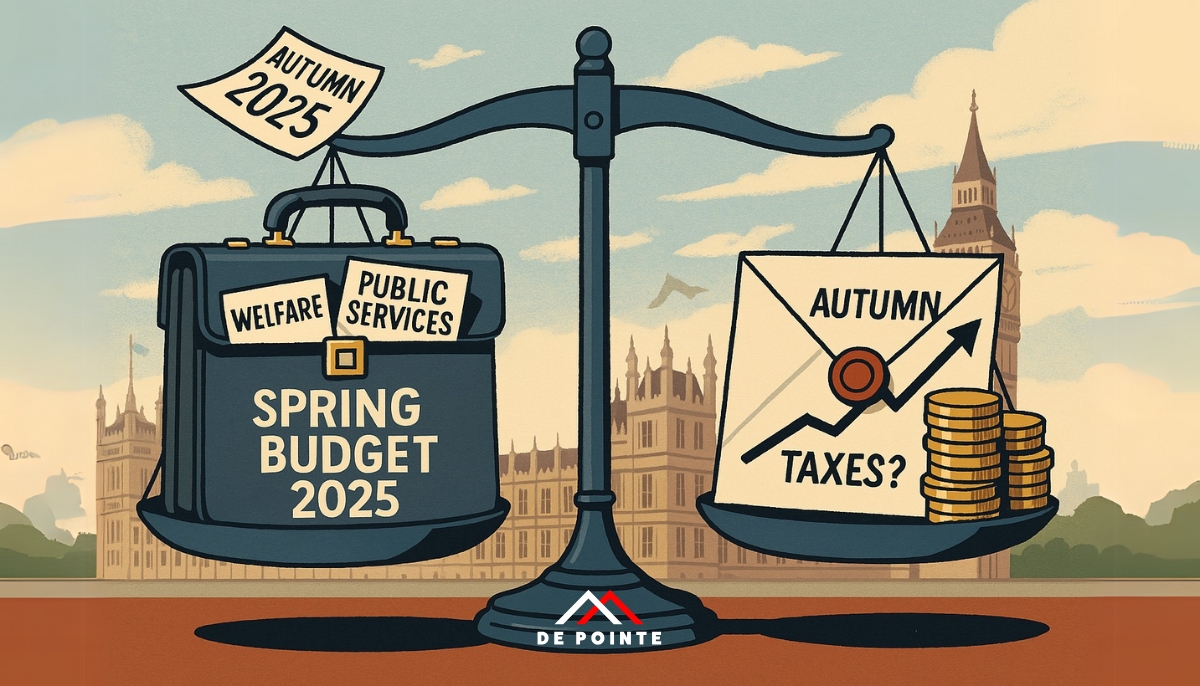Article

The UK’s Spring Budget 2025, delivered by Chancellor Rachel Reeves on March 26th, comes at a critical juncture for the British economy. As the country grapples with sluggish growth, persistent inflationary pressures, and long-term fiscal imbalances, the decisions taken now will shape not just the national balance sheet—but also the strategic positioning of investors navigating uncertain waters.
Spring Budget 2025: Key Highlights
Chancellor Reeves outlined a plan to restore fiscal discipline while leaving room for future manoeuvrability. In contrast to more expansive budgets of recent years, Reeves’ Spring Statement took a more cautious tone, signalling a shift from stimulus to consolidation. Here are the key takeaways for investors and market observers:
1. Major Cuts to Welfare and Public Services
One of the most headline-grabbing announcements in the Spring Budget 2025 was a sweeping £14 billion cut to welfare and public service spending. The Office for Budget Responsibility (OBR) has warned that these cuts could push as many as 250,000 people into relative poverty, including 50,000 children.
While politically controversial, these cuts were framed as necessary to create fiscal headroom and reassure financial markets. For investors, this indicates a government willing to make difficult decisions to stabilise long-term debt levels, a potential signal of medium-term market confidence—albeit at the cost of social equity.
2. Downgraded UK Growth Forecast
The OBR revised its UK economic growth forecast for 2025 from 2% to 1%, citing lower consumer confidence, a tighter labour market, and external global risks. Slower growth creates a challenging backdrop for all asset classes, particularly equities and property, and may prompt a reallocation of capital toward more defensive or alternative investments.
3. No Immediate Tax Hikes—But a Clampdown on Avoidance
While Reeves avoided any direct tax increases in this budget—a move designed to avoid unsettling already-fragile consumer sentiment—the Chancellor unveiled plans to recover £1 billion from tax evasion and avoidance.
The message is clear: the government is prioritising tax fairness and efficiency over rate rises for now. However, this also serves as a placeholder policy, allowing Reeves to delay more controversial fiscal decisions until after the Autumn Budget.
Autumn Budget: Will Taxes Rise in 2025?
While the Spring Budget avoided the politically difficult step of raising taxes, the writing may already be on the wall. As noted by The Guardian and the Institute for Fiscal Studies (IFS), the current fiscal trajectory may leave Reeves with little choice but to explore tax increases in the Autumn Budget 2025.
IFS Director Paul Johnson noted that it’s “unlikely the Chancellor can meet her fiscal targets without new revenue-raising measures.” Given Labour’s commitment to maintaining public service investment while reducing debt, capital gains tax (CGT), inheritance tax (IHT), and wealth taxes may all be under review.
Importantly for high-net-worth individuals and those with exposure to tangible assets such as art, gold, and property, this could materially affect post-tax returns. De Pointe Research anticipates a greater investor appetite for tax-efficient vehicles and inflation-resistant asset classes in anticipation of future tax reform.
Strategic Implications for Investors
In the context of the Spring Budget 2025 and the possibility of tax increases this autumn, investors should consider the following actions:
1. Review Portfolio Tax Exposure
Rebalancing portfolios to reduce exposure to heavily taxed assets—such as UK dividends or capital gains—could be a prudent move. Wealth preservation strategies may need to evolve to reflect a new fiscal reality.
2. Increase Allocations to Tangible Assets
Assets such as fine art, gold, and collectables—which are typically less correlated to traditional markets and can be structured tax-efficiently—are likely to attract renewed interest. These can act as a hedge against both inflation and potential changes to income or capital taxation.
3. Stay Informed and Agile
With economic conditions shifting and tax policy uncertain, proactive planning is more important than ever. Autumn’s fiscal statement could reshape the landscape significantly. Investors working with research-driven, future-focused partners like De Pointe Research will be better positioned to adapt swiftly.
The Spring Budget 2025 offers temporary clarity but foreshadows deeper questions about how the UK will fund public services and manage its debt burden. The absence of immediate tax increases should not be mistaken for permanence. With the Autumn Budget on the horizon, investors should assume that the era of generous tax treatment on wealth may be coming to a close.
De Pointe Research will continue to monitor developments closely, helping our clients navigate these transitions with strategic insight and access to high-performing, tax-efficient opportunities.





